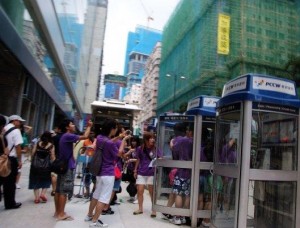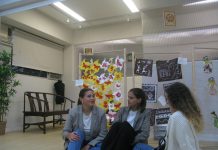What orientation programmes tell us about different cultures
Reporters: Sandy Ho and Gavin Li
You might have come across groups of young people wearing identical T-shirts hurrying down busy streets in bustling city centres before. You may even have seen them mimicking the people on the treadmills in a fitness centre across the street on a busy footbridge in Wan Chai, or shouting “wow” in Causeway Bay’s Times Square for no apparent reason at all.
These fresh-faced youngsters are in fact university freshmen striving to complete various tasks and beat their fellows in a game called “city hunt”, a highlight of university orientation camps, commonly known as “o’camp”, in Hong Kong.
“I think it’s really fun to go around Hong Kong with a group of new friends. Some groupmates know a place better and the others are more familiar with somewhere else. [By] cooperating closely with each other, I feel a sense of achievement [when I see we can finish the task],” says Jessie Kwok Ji-ying, a participant of the orientation camp at Hong Kong Baptist University.
Apart from gaining great satisfaction during the game, Kwok thinks the “city hunt” also helps to develop solidarity and a sense of belonging to the group.

Not everyone is pleased with their presence though. “It’s as if I have entered a wet market with people shouting at you to buy fish and vegetables from them. Do they have to do it on the street?” asks passer-by Yeung Suk-ching in Central.
Dr. Edwin Chan Ho-yin, Chairperson of the Joint Committee on New Student Orientation at the Chinese University of Hong Kong (CUHK) thinks students may be so caught up in the moment, they are not aware of other people’s reactions, “Many are happy about being able to get into university, so they might think the world revolves around them and they can just shout slogans on the street and then run away,’’ he says.
While freshmen in Hong Kong build team spirit by playing games that emulate reality TV, their counterparts elsewhere in the world achieve the same goal in their own distinctive ways.
“We have this race on the river. Every major builds their own boat. Two people are gonna sit on the boat with paddles and the whole school is gonna be there, and you wear the T-shirt from your subject,” Swedish student Stina Alpsten says.
“It doesn’t necessarily have to be a boat. It could be anything that could float on water,” her friend Joanna Bergkvist, who is also from Sweden, adds.
In South Korea, freshmen express their excitement in a less public way. Michael Kim Young-woo, a student at Sung Kyun Kwan University in South Korea recalls an activity called “Room Attack” during their orientation camp.
“Every group has their own room. In the night, we have to attack the other room. We grab some Soju, a type of Korean alcohol, and the group captain would sing some songs and introduce himself, and we will have a drinking game with that group all night.”
Kim notes that the drinking games can serve the same function of fostering unity among the students as a “city hunt” does in Hong Kong.
He says there is no reason to play games off campus, as they would not find it fun to do things in front of the public. “I think Korean students don’t like such things. If we do the games outside the campus, other people are gonna see us. If we do that, like showing off my university student status, I think Korean people don’t like it. We have to act humble.”








































Interesting! And well written!